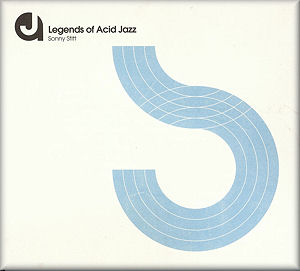1. Turn it On
2. Bar-B-Que Man
3. Miss Riverside
4. Cry Me a River
5. There Are Such Things
6. Goin' to DC
7. Aires
8. Black Vibrations
9. Calling Card
10. Where is Love?
11. Them Funky Changes
Sonny Stitt - Alto sax, tenor sax
Leon Spencer - Organ
Melvin Sparks - Guitar
Idris Muhammad - Drums
Virgil Jones - Trumpet
I have never managed to find out what Acid Jazz is; it seems to be
whatever record company executives want it to be!
What I do know is that Sonny Stitt was one of the finest saxophone
players the world has ever known and a lot of this record did nothing
to show him at his best! The trouble with organs is that you can turn
up the volume with a foot pedal, something most of its exponents do
far too often. The guitarists who play with them often suffer from
the same problem.
Rock rhythms don't and never will swing, which leaves many of the
tracks on this album dead in the water, Sonny Stitt is battling against
enormous odds most of the time, as is trumpet partner Virgil Jones,
who doesn't even get a mention in the inadequate sleeve-note.
By the time we get to Cry Me a River, the electronics have
been turned down and we hear some of the genius of Mr. Stitt at work.
When you hear how beautifully he plays, you wonder how he was persuaded
to play on many of the other tracks. Similarly with There Are Such
Things, the rhythm section reduces the volume and things start
to swing; once again we hear the world class playing of Sonny Stitt.
It is noticeable that on these two tracks he plays all the way through,
I guess he was enjoying himself!
On Goin' to DC, we are back to the loud organ and rock rhythm,
but Aires would be nice if the organ was turned down to ‘bearable':
it manages to drown out both Stitt and the trumpet of Virgil Jones.
The latter being muted doesn't have a chance! Stitt plays very well
on this track despite everything.
Black Vibrations is a good track, it has a nice Latin beat
and both trumpet and tenor can be heard. Calling Card is a
straight-on swinging blues. The first solo by Melvin Sparks on guitar
is rather repetitive, but the trumpet solo is good, Sonny plays the
last solo and again demonstrates his phenomenal technique and inventive
improvisational capability.
He is on alto for Where is Love?, here he demonstrates tone
feeling for a tune plus all the other attributes mentioned earlier.
It is a shame there is only 2.2 minutes of it. Funky Changes
has again a Latin feel; it is organ driven, but not to such an extent
as other tracks.
This album is like the curate's egg, good in parts, but for readers
who would like to have some of the work of Sonny Stitt in their collection,
there are many superior examples available.
Don Mather
